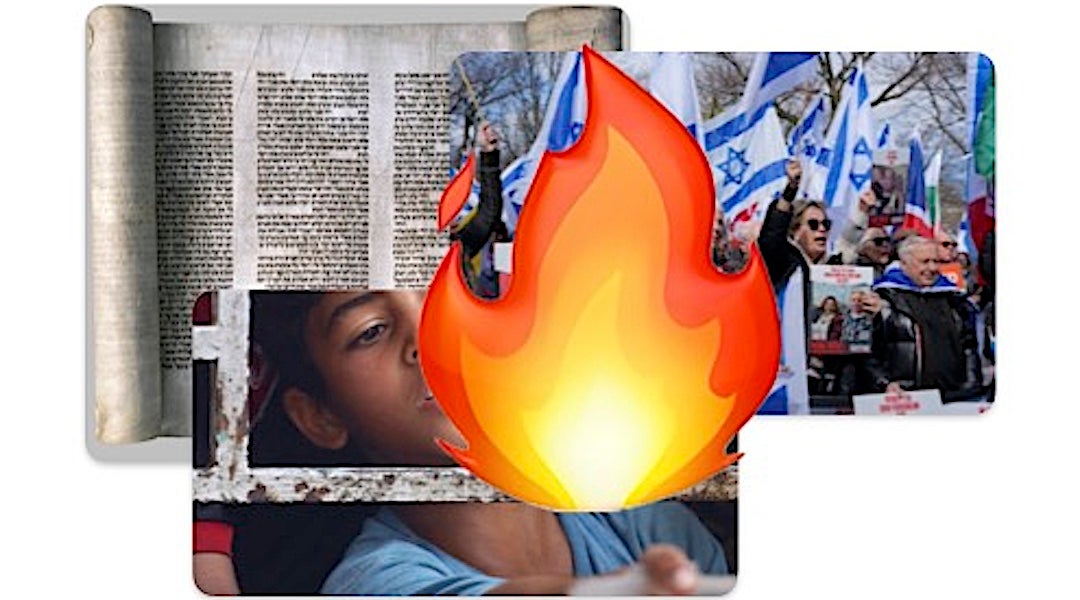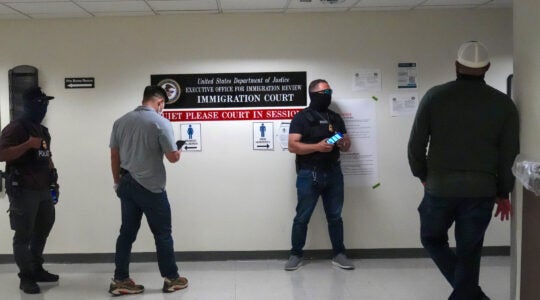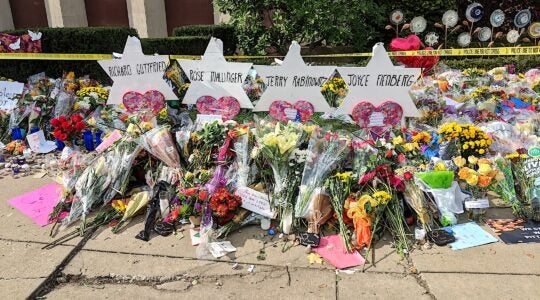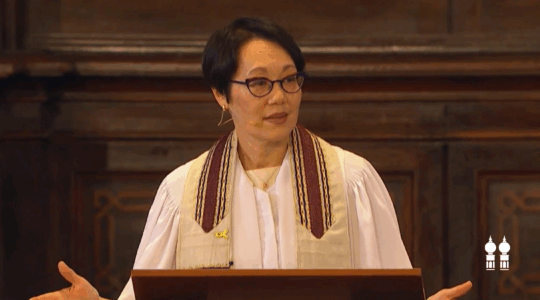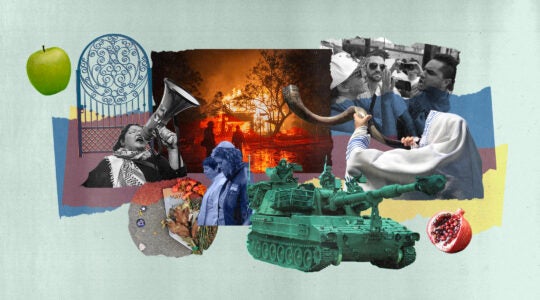After weeks of mounting pressure on Israel to address reports of a humanitarian crisis in Gaza, with longtime allies lining up to condemn the government or recognize a Palestinian state, the largest Jewish federation in the United States took a newsmaking step.
UJA-Federation of New York said it would allocate $1 million to IsraAID, a humanitarian organization in Israel that would provide clean water, medicine and food to be delivered to those hungry in Gaza. “Understanding that Hamas bears ultimate responsibility for this conflict does not negate that civilians in Gaza are facing desperate conditions,” UJA CEO Eric Goldstein wrote in a letter Aug. 8 announcing the allocation.
Jewish federations aren’t in the habit of donating to Palestinians, especially in wartime, and blowback from some givers and critics was inevitable. “Not everyone agrees on what should be done, or how,” Goldstein wrote.
That may have been an understatement. In the Facebook comments accompanying the announcement, following a scattering of positive reactions, the conversation turned vitriolic.
“Can you imagine Jews in WWII starting a campaign for Germans, in the midst of a war? This is obscene.”
“Why, nobody would ever help us.”
“Not one more dime for you UJA-Federation of New York. What about our hostages?????”
“The UJA-Federation of New York has committed a profound act of moral confusion. In allocating $1 million to provide aid to Gaza through IsraAID, the organization has chosen fashionable sentiment over its founding purpose. This represents charity as moral preening, divorced from Jewish interests and survival.”
Nearly two years into the war launched on Oct. 7, 2023 by the Hamas attacks on southern Israel, the Jewish conversation has shifted. Jews who have taken to social media to condemn Hamas, anti-Israel protesters and the colleges and politicians they say have enabled antisemitism are now turning on fellow Jews — and not just anti-Zionist Jews, who if anything united the mainstream in a common disdain.
The current conversation pits fierce defenders of Israel and the war in Gaza against what Rabbi Donniel Hartman, the president of the Shalom Hartman Institute, calls the “troubled committed”: Jews who support Israel and have defended the war to rout Hamas and bring home the hostages, but are deeply troubled by the reports of hunger, the extent of the destruction in Gaza and the enormous death toll among non-combatants there.
The acrimony between the two camps is seen on social media and in everyday conversations, where calls for showing compassion to the Gazans are met with accusations of naivete, hypocrisy and shirking responsibilities to fellow Jews. The discourse is fraying a community already feeling demoralized by rising antisemitism and what two Boston-area trauma therapists — Miri Bar-Halpern and Jaclyn Wolfman — call “traumatic invalidation”: when outsiders deny Jews’ emotional pain and even their right to express it.
“We are caught up in these rigid political and ideological camps that define and segregate us from one another as if we’ve shattered into multiple tribes again,” wrote Alana Zeitchik, who advocates for Jewish peoplehood as executive director of The Narrow Bridge Project, in a recent JTA oped. “I find myself calling out: Don’t you get that we are at war with ourselves? And we have to find a way to put the pieces back, perhaps to create something new, or we will not survive.”

A billboard in New York City’s Times Square displaying a video released earlier this month by Hamas of one of its Israeli hostages, Evyatar David. (Screenshot)
Tension between the two committed camps — the troubled and the untroubled — played out last Sunday in London at a rally in support of the Israeli hostages in Gaza. Two rabbis, representing Great Britain’s version of the Reform movement, were jeered off the stage after they condemned both Hamas and the Israeli politicians whose “rhetoric” they said had made it harder to bring the hostages home.
“Like thousands of Jews in Israel and around the world, as leaders of Progressive Judaism we express our fears about policy in Gaza and the Jewish extremist violence we see in the West Bank,” Rabbis Charley Baginsky and Josh Levy said, or tried to say, in their speech. “It is doing lasting damage to Israel, its standing in the world and the prospects of secure peace for all Israelis and Palestinians.”
Ironically, the event was pitched as a demonstration of Jewish unity. “We are coming together, regardless of our differences, for one purpose: to stand for the hostages,” the Board of Deputies of British Jews tweeted before the march began.
Leaders of the international Reform and Progressive Judaism movement expressed their dismay over such a public display of internal discord.
“Particularly at a time when the Jewish people are experiencing so many challenges from beyond our community, we are especially pained by such offensive and intolerant behavior from fellow Jews,” they wrote in a joint statement. “There is more than one way to be Jewish, more than one way to love Israel, and more than one way to achieve the goal of fulfilling the mitzvah of pidyon sh’vuim [bringing home the hostages]…. Our shared future depends on our ability to hold our differences with dignity, to listen even when we disagree, and to remain in relationship despite our divisions.”
Such schisms have some in despair over the war’s toll on Judaism itself.
“My connection to Judaism is almost gone. Even though I’ve been living in Israel almost my entire adult life. Even though I’ve dedicated all my studying and all my professional work to Jewish education and activism and thought,” wrote Elana Sztockman, a Jewish feminist author and educator in Israel. “I’ve done all that. My entire life. And today, I have zero interest in being connected Jewishly. I feel like we have lost our moral core. Lost our ability to claim that we are some kind of good people, chosen people.”
Sentiments like hers suggest that the current Jewish disagreements are not just political, but deeply tied up in what it means to be Jewish.
Those calling for compassion and ending the war commonly express themselves in religious terms. A letter signed by 1,000 rabbis and other Jewish leaders, urging Israel to allow extensive humanitarian aid into Gaza, called on Netanyahu “in the name of the sanctity of life, of the core Torah values that every person is created in God’s image, that we are commanded to treat every human being justly, and that, wherever possible, we are required to exercise mercy and compassion.”
The letter warned that the current course of the war risks “the moral reputation not just of Israel, but of Judaism itself, the Judaism to which our lives are devoted.”
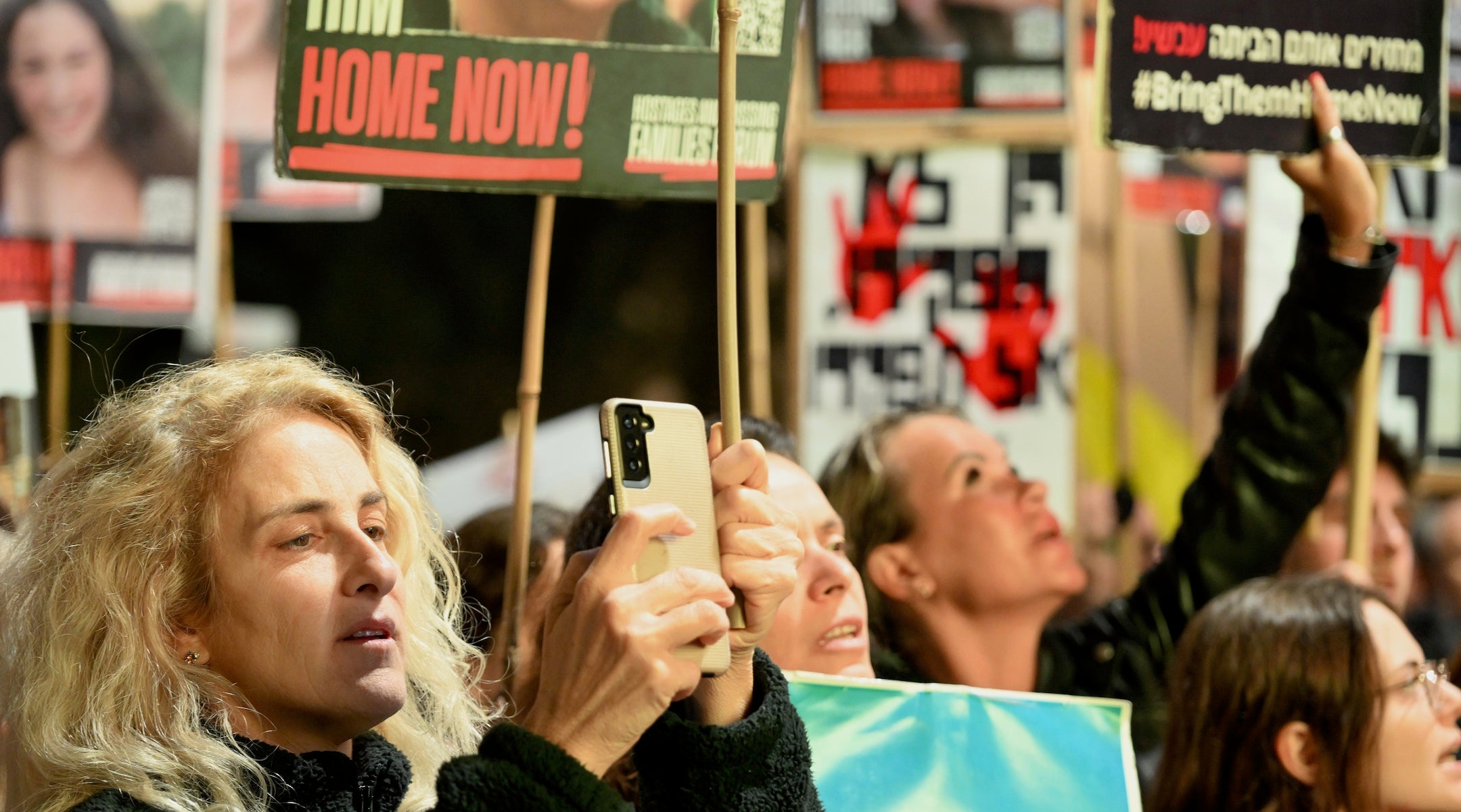
Demonstrators gather at Hostages Square in Tel Aviv, Israel, Jan. 11, 2025. (U.S. Embassy Jerusalem)
Critics of such calls for mercy also invoke Judaism and tradition, and suggest that in order to protect Jews from further attacks and free the hostages, Jewish security trumps compassion.
“Jewish history, with its long memory of persecution, demands recognition of the necessity of self-defense,” Mitch Danzig, an attorney and past president of the pro-Israel group Stand With Us in San Diego, wrote in response to a local Jewish politician’s despair about the “brutality” of the Gaza war. “It teaches that liberty cannot coexist with tyranny, and that protecting innocent life sometimes requires dismantling the forces that would destroy it. Judaism is not a pacifist faith — it understands the concept of a ‘just war.’”
In a social media post on Aug. 13, as it did in its first announcement of the allocation, UJA-Federation emphasized that Hamas is responsible for the humanitarian crisis in Gaza, and that Israel is being unfairly blamed as international support erodes.
To counter that, according to the post, and to support a government strategy to ensure aid bypasses Hamas, the federation is working with IsraAID, which has more than 20 years’ experience in 60 countries, delivering aid effectively in high-risk environments, and is working in conjunction with the Israeli army to deliver the aid in Gaza.
“This funding helps advance Israel’s strategic objectives while safeguarding its international standing,” read the post.
In addition, UJA-Federation, like some of its critics, framed its position in terms of Jewish tradition and values. (The organization, which distributed more than $250 million in 2024, is a supporter of 70 Faces Media, the Jewish Telegraphic Agency’s parent company.)
“We must hold tight to what has always anchored the Jewish people: the belief that all human life is sacred,” said Goldstein, referencing a theological concept, known in Hebrew as tzelem Elohim, which posits that all human beings are created in the image of God.
Goldstein went on to quote an oped by Dani Dayan, the former Israeli diplomat who heads the Yad Vashem Holocaust authority: “There are many men, women, and children [in Gaza] with no connection to terrorism who are experiencing devastation, displacement, and loss. Their anguish is real, and our moral tradition obligates us not to turn away from it.”
Commenters objecting to the UJA-Federation allocation also invoked Jewish tradition and values. One Facebook commentator referenced the introspective period ahead of the High Holy Days, which commences Aug. 25 with the beginning of the Hebrew month of Elul.
“As we enter the month of Elul, I suggest that UJA New York make a cheshbon hanefesh (a look at one’s actions) and see if this money is being spent in the best place for Kol Yisrael,” they wrote.
Igal Hecht, an Israeli-Canadian filmmaker, complained that the UJA-Federation statement was “dripping with the empty clichés of ‘Torah values’ trotted out only when they want to justify helping those who seek our destruction. Our Torah also teaches how to deal with enemies who rise to kill us, but they never quote those parts. They cherry-pick compassion while ignoring justice.”
Rabbi Menachem Creditor, the scholar-in-residence at UJA-Federation, offered a gentle, even sympathetic response to that kind of overheated rhetoric on Monday during his daily live Facebook chat.
“The $1 million allocation is an important statement that humanity matters, we are called to be part of fixing the world, and that doesn’t override our commitment to our family, nor does it create a kind of naivete where we would, God forbid, ignore the vulnerability of the Jewish community, the Jewish state,” he said.
(Since the Oct. 7 attacks, the federation has allocated roughly $300 million in support for Israelis, including mental health services, help for communities displaced by the war and hospitals and emergency preparedness.)
He offered advice to viewers on how to deal with deep Jewish divisions, and how to respond to those who object to a Jewish organization offering aid to Gazans.
“Making an allocation that goes to the hungry and suffering in Gaza is a trigger for some…, especially given the hurt that Hamas has caused our family, or people,” Creditor said. “It’s understandable. Reactivity is understandable.”
“If you see someone who’s responding with heat and anger,” he continued, “I would suggest you simply say ‘I understand that pain, I share that pain. This work is big and eternal, and all I wish for you is love.’”
This story has been updated since publication with additional information about UJA’s donation and how it’s being distributed.
JTA has documented Jewish history in real-time for over a century. Keep our journalism strong by joining us in supporting independent, award-winning reporting.

